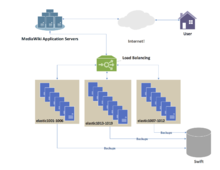
Back موازنة الحمل (حوسبة) Arabic Load balancer BS Distribució de càrrega Catalan Vyvažování zátěže Czech Lastverteilung (Informatik) German Εξισορρόπηση φόρτου (υπολογιστές) Greek Equilibrio de carga Spanish Koormusjaotus Estonian متعادل نمودن بار ترافیکی Persian Kuormituksen tasaaminen Finnish

In computing, load balancing is the process of distributing a set of tasks over a set of resources (computing units), with the aim of making their overall processing more efficient. Load balancing can optimize response time and avoid unevenly overloading some compute nodes while other compute nodes are left idle.
Load balancing is the subject of research in the field of parallel computers. Two main approaches exist: static algorithms, which do not take into account the state of the different machines, and dynamic algorithms, which are usually more general and more efficient but require exchanges of information between the different computing units, at the risk of a loss of efficiency.